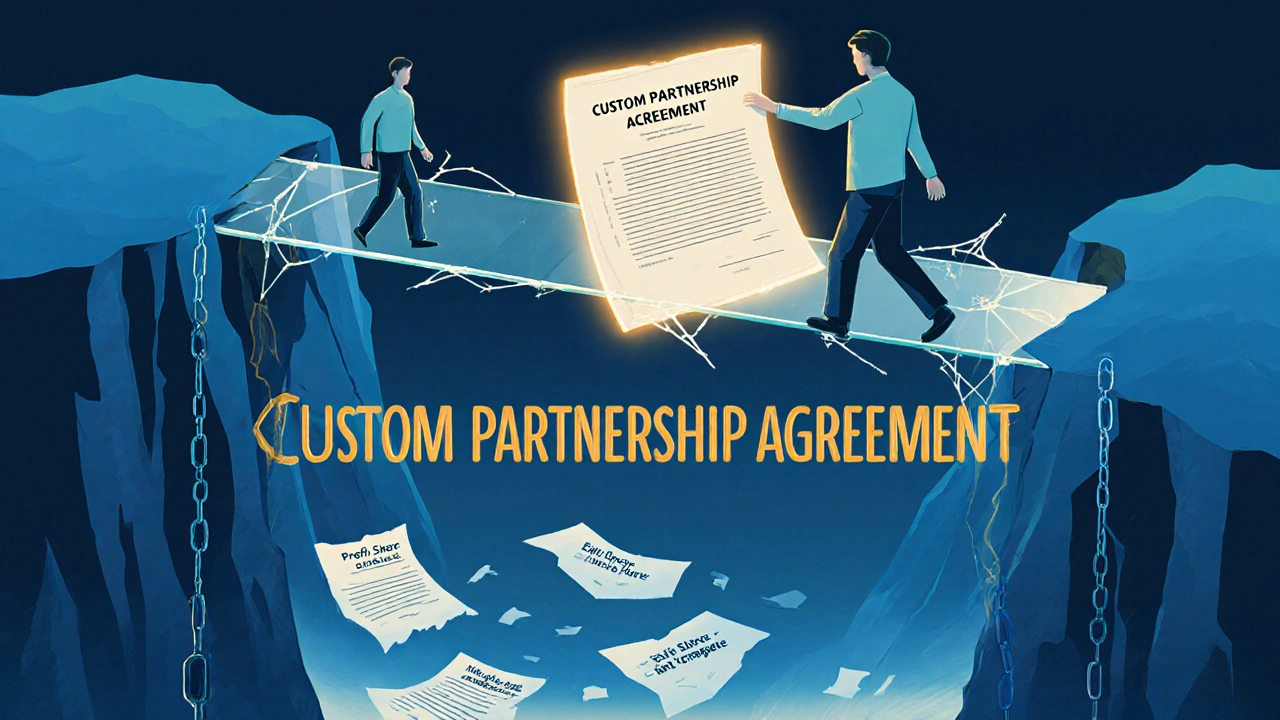Partnership Agreements in the UK: Key Clauses and Governance
17 Oct, 2025When two or more people start a business together in the UK, they often skip the hard part: writing down how things actually work. They trust each other. They shake hands. They assume everyone’s on the same page. Then, six months in, someone quits, a profit dispute pops up, or a client sues the whole group. That’s when they realize they never signed a proper partnership agreement.
Why a Written Partnership Agreement Matters
The UK doesn’t force you to write one. Under the Partnership Act 1890, if you don’t have a written agreement, the law steps in with default rules that rarely match what partners actually want. These defaults assume equal shares, equal decision-making, and no way to kick someone out-even if they stop showing up or start stealing clients. Real partnerships aren’t built on trust alone. They’re built on clarity. A solid agreement prevents 80% of disputes before they start. It answers questions like: What happens if one partner dies? Who controls the bank account? Can someone start a competing business next door? Without answers, you’re leaving your business to chance.Key Clauses You Can’t Skip
A strong partnership agreement isn’t a form letter. It’s a custom blueprint. Here are the five clauses that make or break most UK partnerships:- Profit and Loss Sharing - Don’t assume 50/50. Maybe one partner brings the clients, another does all the work. Maybe one invested £50,000 and the other invested time. Define exact percentages. Include how often profits are distributed-monthly, quarterly, annually. And specify how losses are handled. If the business loses money, does everyone chip in equally? Or only up to their initial investment?
- Decision-Making Authority - Who approves spending over £5,000? Who hires staff? Who signs contracts with suppliers? Some partnerships use unanimous votes. Others let one partner handle operations and another handle finances. Write it down. Ambiguity here leads to power struggles.
- Roles and Responsibilities - Vague job descriptions cause resentment. Instead of saying “both partners contribute,” say: “Partner A manages client relations and handles all marketing. Partner B manages bookkeeping, payroll, and compliance with HMRC.” Include hours expected, reporting lines, and performance expectations.
- Exit Strategy - This is the most overlooked clause. What if one partner wants out? Can they sell their share? To whom? Is there a right of first refusal? How is the business valued? Use a pre-agreed formula-like 3x net profit-or hire an independent valuer. Include a notice period (usually 3-6 months) and a payment plan if the remaining partners buy them out.
- Non-Compete and Confidentiality - If a partner leaves, can they open a similar business down the street? Can they take your client list? Most UK courts enforce reasonable non-compete clauses if they’re limited in time (usually 12 months) and geography (e.g., 10 miles from your office). Include a confidentiality clause that covers customer data, pricing models, and internal processes.
Governance: How Decisions Are Made and Enforced
Governance isn’t just about who says what. It’s about how the partnership stays functional over time. A good agreement includes a governance structure that keeps things running smoothly.- Regular Meetings - Schedule quarterly business reviews. Minutes should be taken and signed by all partners. This creates a paper trail for decisions and holds everyone accountable.
- Dispute Resolution - Don’t wait for a lawsuit. Include a step-by-step process: first, mediation with a neutral third party. If that fails, arbitration. Court should be the last resort. Most UK partnership disputes settle before trial if there’s a clear path to resolution.
- Deadlock Provisions - What if partners vote 50/50 on a major decision? Include a tiebreaker: a trusted advisor, a rotating third-party vote, or a “shotgun clause” where one partner offers to buy the other out at a set price, and the other must either accept or buy them out at the same price.
- Record Keeping - Require all financial records, contracts, and client lists to be stored in a shared, secure digital system. Access should be granted to all partners. No one should have sole control over the books.
What Happens Without a Partnership Agreement
The Partnership Act 1890 still applies if you don’t have a written contract. Here’s what that means in practice:- All partners get equal profit shares-even if one did 90% of the work.
- No partner can be forced out, even if they’re negligent or dishonest.
- The partnership automatically dissolves if one partner dies, goes bankrupt, or quits.
- Partners can’t draw a salary; they only get a share of profits.
- There’s no legal way to stop a former partner from competing.

Partnership vs. Limited Company: What’s the Difference?
Many UK partners wonder: Should we form a limited company instead? It’s a valid question.- Partnership: Simple to set up, low cost, profits taxed as personal income. But partners have unlimited liability-your home, savings, and car can be seized if the business owes money.
- Limited Company: More paperwork, annual filings, corporation tax. But liability is limited to what you invest. Your personal assets are protected. You can also issue shares, attract investors, and build brand credibility.
Common Mistakes to Avoid
Here’s what most UK partnerships get wrong:- Using online templates - Generic templates ignore your industry, location, and unique risks. A template for a bakery won’t work for a digital marketing agency.
- Delaying the agreement - Waiting until things get tense means one partner has leverage. Sign it on day one, even if you’re just starting.
- Not updating it - Your agreement should evolve. Add new clauses when you hire your first employee, expand to a new city, or bring in a silent investor.
- Not involving a solicitor - A £500 legal review saves you £50,000 in court fees later. Look for solicitors who specialize in SME partnerships.
- Ignoring tax implications - Partnerships are pass-through entities. Each partner pays income tax and National Insurance on their share. Plan for this. Don’t assume profits will be spent on the business.
When to Get Legal Help
You don’t need a lawyer to draft a basic agreement. But you do need one if:- One partner is investing significantly more capital.
- You’re bringing in a silent investor or non-active partner.
- Your business operates across multiple countries.
- You’re in a regulated industry (finance, healthcare, legal services).
- You’ve had a falling out before.

Final Checklist Before Signing
Before you sign anything, run through this:- Are profit shares clearly defined and tied to contributions?
- Is there a clear process for adding or removing partners?
- Does the agreement include a valuation method for buyouts?
- Are non-compete and confidentiality terms reasonable and enforceable?
- Have all partners read and understood every clause?
- Has a solicitor reviewed it for compliance with UK law?
- Is there a plan to review and update the agreement every 12-18 months?
Partnership Agreements Are About More Than Law
A well-written partnership agreement isn’t a legal weapon. It’s a tool for trust. It says: “I respect you enough to be clear about what we’re doing, how we’ll handle problems, and what happens if things change.” The best partnerships don’t avoid conflict-they manage it well. And that starts with a document no one wants to write… but everyone wishes they had.Is a partnership agreement legally binding in the UK?
Yes, a written partnership agreement is legally binding in the UK as long as it’s signed by all parties and meets basic contract requirements: offer, acceptance, consideration, and intention to create legal relations. Even without a signature, if partners act in line with the terms, courts may enforce it under implied contract principles. But a signed, clear document is the only way to guarantee enforceability.
Can I write my own partnership agreement without a lawyer?
You can draft one yourself using templates, but it’s risky. Many DIY agreements miss critical legal nuances-like how to value a partner’s share or how to handle a dispute involving HMRC. A solicitor ensures your agreement complies with the Partnership Act 1890, the Companies Act 2006, and tax rules. For partnerships with more than £100,000 in revenue or multiple partners, legal review is strongly advised.
What happens if a partner dies without a partnership agreement?
Under the Partnership Act 1890, the partnership automatically dissolves upon a partner’s death. The deceased’s share becomes part of their estate and is distributed to heirs. This can freeze the business, trigger tax liabilities, and force a rushed sale. A good agreement includes a buyout clause that lets surviving partners purchase the deceased’s share at a pre-agreed value, avoiding disruption.
Can a partner be forced out of a UK partnership?
Only if the partnership agreement allows it. Without a written agreement, no partner can be removed-even if they’re inactive, underperforming, or acting dishonestly. Courts won’t force someone out unless there’s fraud or gross misconduct. A well-drafted agreement includes expulsion clauses triggered by specific behaviors, like breach of confidentiality or failure to meet performance targets.
Do I need to register my partnership agreement with Companies House?
No, you don’t need to register a partnership agreement with Companies House. Only limited companies and LLPs must file documents there. General partnerships only need to register with HMRC for Self Assessment. The partnership agreement itself remains a private document between partners. However, if you form an LLP (Limited Liability Partnership), you must file a partnership agreement with Companies House as part of your registration.
